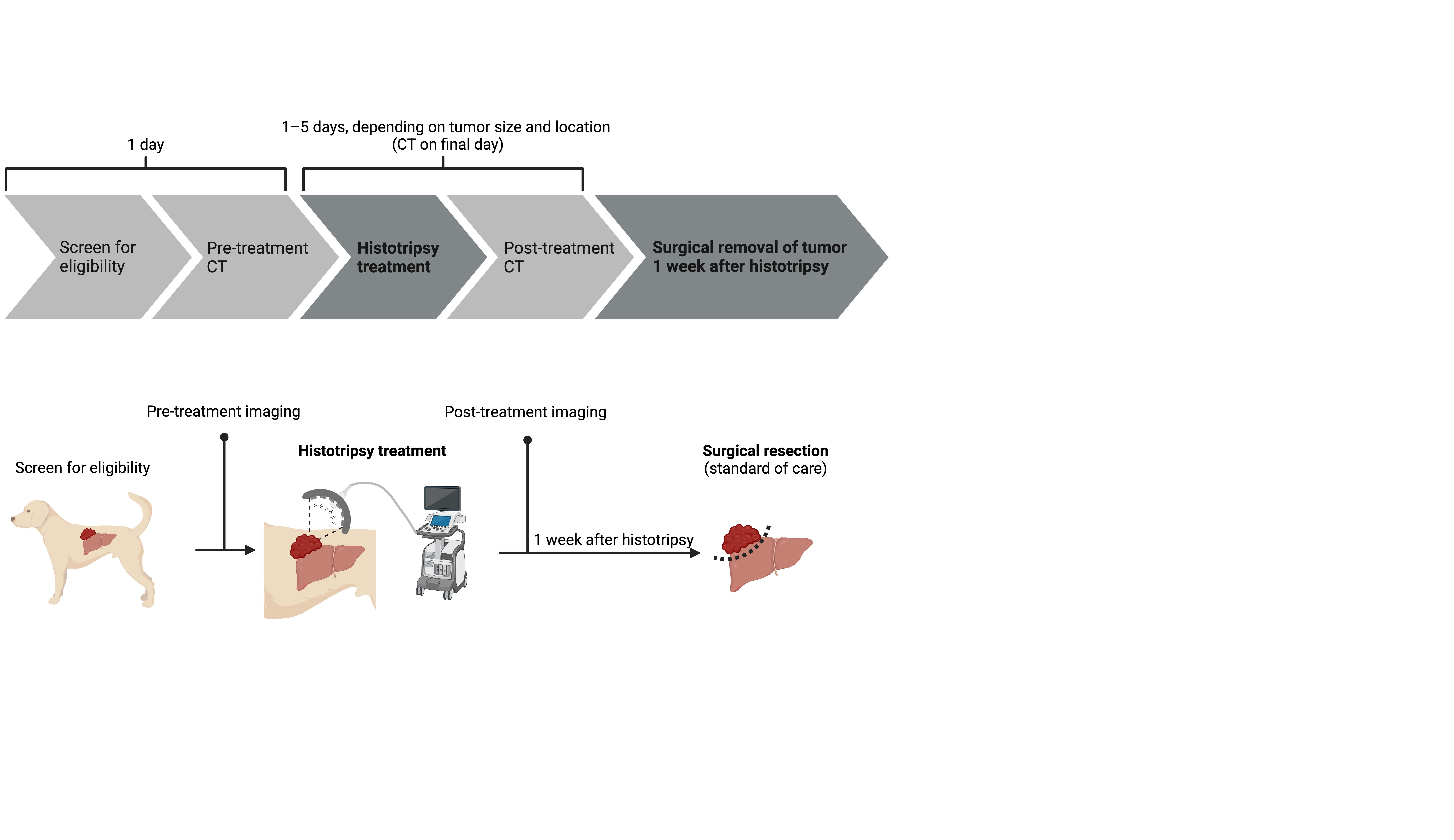Noninvasive Treatment of Liver Tumors in Dogs
Evaluating an ultrasound technology for the non-invasive treatment of liver tumors in dogs
Principal Investigator
-
Bio Item
 Joanne Tuohy, DVM, PhD, DACVS–Small Animal , bio
Joanne Tuohy, DVM, PhD, DACVS–Small Animal , bioAssociate Professor, Surgical Oncology
Contacts
Robyn Fox, LVT
Clinical Trials Coordinator
Purpose
To evaluate the effects of histotripsy, an ultrasound-based treatment that can non-invasively destroy tumor tissue without radiation or heat, on dogs with liver tumors.
Background
In this study, we are evaluating the effects of histotripsy, an emerging technology that used focused ultrasound waves to mechanically destroy tumor tissue, on dogs with oral tumors. Histotripsy has the ability to precisely destroy tumors non-invasively and without using heat or radiation. Histotripsy also has the potential to stimulate the immune system into fighting off remaining or microscopic tumor. Our team’s previous research has evaluated the safety and efficacy of histotripsy for bone tumors, soft tissue sarcomas, and brain tumors in dogs. We are now interested in how histotripsy affects oral tumors in dogs.
Histotripsy was FDA-approved for the treatment of liver tumors in humans in 2023, with promising clinical results. We now want to investigate how histotripsy treatment affects liver tumors in dogs, followed by surgical resection (removal) of the tumor 1 week after histotripsy. This allows us to evaluate the effects of the histotripsy treatment in the tumor tissue while providing the patient with standard-of-care. This study also includes blood sample collection before and after histotripsy (at the screening, treatment, and surgery visits) to let us explore how the immune cell populations change after histotripsy treatment.
Eligibility
- Confirmed or probable diagnosis of liver cancer- based on imaging, cytology, and/or histopathology
- Dogs weight 20kg or higher
- Owner has elected for standard-of-care surgical resection of the liver tumor
- Eligibility will then be determined by the care team at the pre-screening appointment
Exclusion Criteria
- Previous local or systemic tumor treatment
Study Design
Dogs will undergo a contrast-enhanced CT scan (if not obtained previously during diagnostics) to visualize the liver tumor and plan the histotripsy treatment. On the day of treatment, hair will be removed from the area overlying the tumor to allow for maximum transmission of the ultrasound waves. Histotripsy treatment will be delivered non-invasively through the skin to mechanically disintegrate the underlying tumor. Dogs will be maintained and monitored under anesthesia. Immediately after the completion of histotripsy treatment, a blood sample will be collected to look at immune cell populations, and a CT scan will be obtained to determine the immediate effect of the ultrasound treatment. Most patients recover uneventfully and go home the same day. Depending on the size of the tumor, more than one treatment may be required.
One week after the completion of histotripsy treatment, dogs will undergo standard-of-care surgical resection. Another blood sample will be collected prior to surgery. From the tumor sample obtained from surgery, treated and untreated tumor regions will be analyzed for immune cell populations and effects of histotripsy treatment. This allows us to assess the ablative and immunostimulatory effects of the treatment. At this point, participation in the study is complete.

Compensation
There are no costs to the owner for their dog to participate in the study. All histotripsy treatment related costs will be covered by the study. The study will pay $2000 towards the cost of the liver tumor resection surgery performed at Virginia Tech. The study does not cover costs associated with any complications from study procedures.
Contact
- If you'd like to proceed with a study screening appointment, please ask your veterinarian to initiate a referral. Please note that the cost of the screening visit is typically not covered by the study.
- If you'd like to be contacted with more information about this study and/or would like to discuss a case prior to referral, please complete our phone consultation request form.
- If your query is urgent, please call the Animal Cancer Care and Research Center at 540-526-2300.


